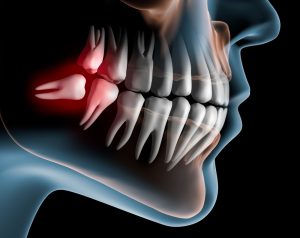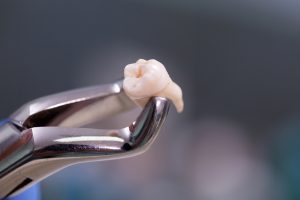Gentle & Comfortable Wisdom Teeth Extractions
Wisdom teeth, also known as third molars, often emerge in the late teens or early twenties and can bring about a variety of dental challenges. One of the most dreaded challenges most individuals must face is tooth extractions. Fortunately, at Cohen Dentistry, our experienced Harris, NY dentist, Dr. Ari Cohen is determined to provide gentle and seamless wisdom tooth extractions.
If you’re in need of a wisdom tooth removal, contact Dr. Cohen today by giving Cohen Dentistry a call at (845) 794-4545.
What Are Wisdom Teeth?
Wisdom teeth are the last set of molars at the back of the mouth. They typically emerge in late adolescence or early adulthood. While some people have no issues with their wisdom teeth, others may experience discomfort or complications and will need their impacted wisdom teeth removed.
Benefits of Wisdom Teeth Removal
 Wisdom teeth, or third molars, often require removal due to potential issues they can pose. Here are the key benefits of wisdom teeth removal:
Wisdom teeth, or third molars, often require removal due to potential issues they can pose. Here are the key benefits of wisdom teeth removal:
- Preventing Overcrowding: Wisdom teeth can cause overcrowding, leading to misalignment of existing teeth. Removal helps maintain proper dental alignment.
- Avoiding Infections: Impacted wisdom teeth create pockets where bacteria can accumulate, increasing the risk of infections. Removal eliminates this breeding ground for bacteria.
- Alleviating Pain and Discomfort: Problematic wisdom teeth can result in pain, headaches, and jaw discomfort. Removal provides relief from these discomforts, enhancing overall oral well-being.
- Preventing Damage to Adjacent Teeth: Wisdom teeth may erupt at awkward angles, potentially damaging adjacent teeth. Removal prevents such damage and preserves the integrity of neighboring teeth.
- Enhancing Oral Hygiene: Due to their location, wisdom teeth can be challenging to clean properly, leading to oral hygiene issues. Removal simplifies oral care routines, reducing the risk of cavities and gum disease.
Signs You Need a Wisdom Tooth Removed
Identifying the need for wisdom teeth extraction is essential for timely intervention. Look out for the following signs:
- Persistent Pain or Discomfort: Continuous pain in the back of the mouth, often radiating to the jaw or head, can indicate issues with wisdom teeth.
- Swelling or Redness Around Gums: Inflammation or redness around the gums, especially in the back of the mouth, may signal problems with wisdom teeth.
- Difficulty Opening Your Mouth: If you experience challenges in fully opening your mouth or if it feels restricted, it could be a sign of impacted wisdom teeth.
- Headaches or Jaw Pain: Persistent headaches or pain in the jaw, especially in the vicinity of the wisdom teeth, may be indicative of underlying issues.
- Difficulty Chewing or Biting: If you encounter difficulties while chewing or biting, it may be related to the positioning or condition of your wisdom teeth.
If you observe these signs, consulting Dr. Cohen for a thorough examination is best. Early detection and intervention can prevent potential complications associated with problematic wisdom teeth.
Wisdom Tooth Removal Process
 Anesthesia and Incision
Anesthesia and Incision
Once the anesthesia takes effect, creating a painless environment, your Harris dentist will initiate the extraction process.
In cases where the wisdom tooth is partially or fully impacted, meaning it hasn’t fully emerged through the gum line, Dr. Cohen may need to remove a small portion of the tooth or bone to facilitate the extraction. This step is crucial for ensuring a smooth and controlled removal process.
Extracting the Wisdom Tooth
The extraction itself is executed with specialized dental instruments designed for this purpose. Dr. Cohen will gently and skillfully loosen the tooth from its socket in the jawbone. This process may involve carefully maneuvering the tooth to navigate around surrounding structures and minimize trauma to the jaw bone, neighboring teeth and gum tissues.
Stitching and Gauze Placement
Following the successful extraction, Dr. Cohen may employ stitches to close the incision. The purpose of stitching is not only to bring nearby teeth and the gum tissue back together but also to promote proper healing and reduce the risk of infection. The choice of stitches may vary, ranging from dissolvable stitches that don’t require removal to traditional stitches that may need extraction in a subsequent appointment.
Aftercare for Wisdom Tooth Removal
Ensure a successful recovery by adhering to these aftercare tips:
- Bite Down on a Gauze Pad: Control bleeding by gently biting on a gauze pad for the recommended duration.
- Take Prescribed Pain Medication: Follow the prescribed pain medication regimen to manage discomfort.
- Rest and Avoid Strenuous Activity: Allow your body to heal by refraining from strenuous activities in the first few days.
- Avoid Smoking and Using Straws: Prevent complications by avoiding activities that create suction in your mouth.
- Keep Your Mouth Clean: Maintain oral hygiene by gentle brushing and rinsing with salt water multiple times a day.
Frequently Asked Questions
The pain experienced during wisdom tooth extraction varies from person to person. While some individuals report mild discomfort, others may experience more intense pain. However, dentists typically manage pain effectively with prescribed painkillers, dental sedation, or local anesthetics.
The recovery time from a wisdom tooth extraction is variable and depends on factors such as the number of teeth that need to be removed, the complexity of the extraction, and individual health. Generally, it can take anywhere from a few days to a week or more to fully recover. Following postoperative care instructions diligently can contribute to a smoother recovery process.
In the initial days after wisdom tooth extraction, it’s advisable to stick to soft, easy-to-chew foods. Some suitable options include soups, mashed potatoes, yogurt, smoothies, and scrambled eggs. It’s essential to avoid hard, crunchy, or sticky foods, as well as hot and spicy items that could irritate the wisdom teeth extraction site.
The risk of dry sockets (a painful condition where the blood clot that normally forms after extraction is dislodged or dissolves) and blood clots is highest in the first few days after the extraction. Following the aftercare instructions provided by your dentist is crucial during this period.
Schedule Your Wisdom Tooth Removal Today!
If wisdom teeth are causing you discomfort, your Harris, NY dentist is here to help. Schedule an appointment with Dr. Ari Cohen today by giving Cohen Dentistry a call at (845) 794-4545. Our skilled team is committed to restoring your oral health!
